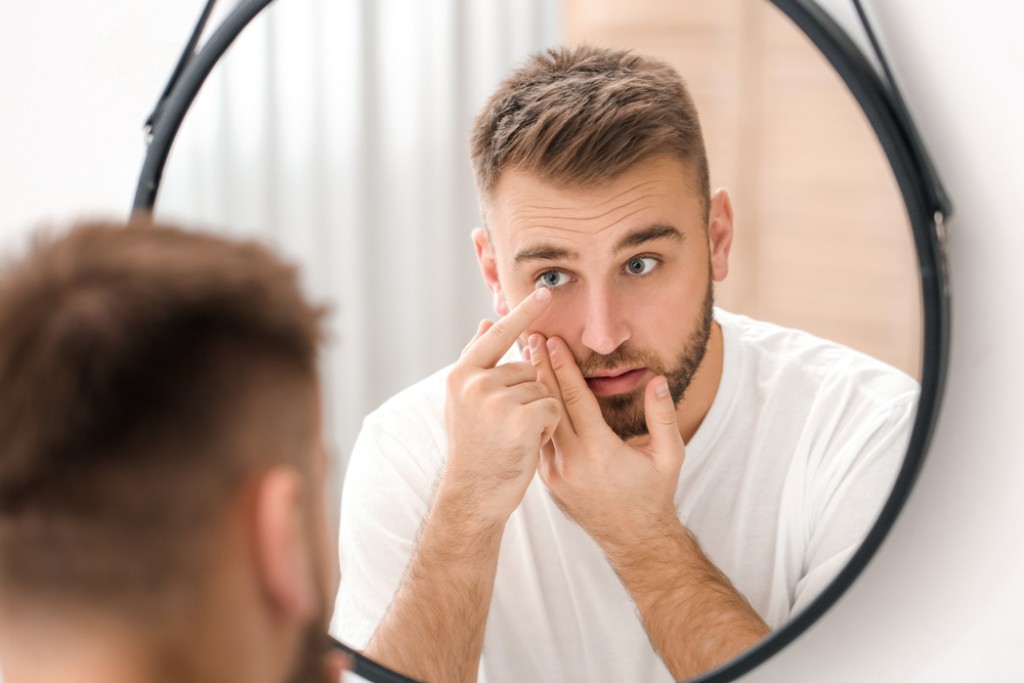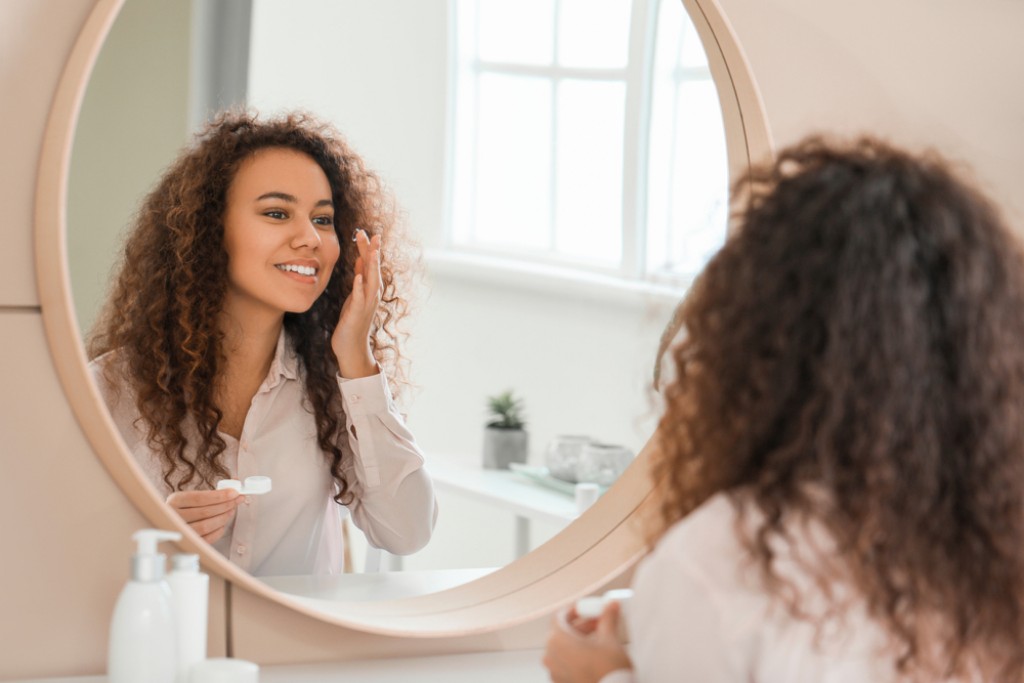Among most uses of contact lenses, the goal is to enable perfect vision. Even for those with myopia, being visually impaired, or a cylinder problem, a lens can be helpful. However, one must always wear them on the advice of their eye doctor.
You may be unsure how to care for contacts if you have just had them fitted. It might not be as easy as just slipping on a pair of eyeglasses. It may take longer to adjust to them.
There are many options to reduce the need to correct vision. Although contact lenses (both hard and soft) have been suggested, specific glasses and eye drops have also been suggested. However, these have had varying degrees and success rates.
It is a good idea to tell your children to put away their devices. Many studies have shown that near-work can lead to myopia.
Myopia progression can also be linked to light levels. It’s recommended that children get outside and play, which will keep them from getting distracted by their devices.

The frequency of examination by ophthalmologists
Before you start using contact lenses, it is important to first have an eye check-up from a professional doctor. According, an examination with ophthalmologists is essential and should be performed once a year. Does that sound excessive to you? It turns out that you are not alone – 80% of people neglect their eyes and do not perform the tests as required. In this case, of course, it is not advisable not to follow the path of the majority to keep your vision healthy and safe. In some cases, the frequency of examination by ophthalmologists is much more important. Slowing the rate of development of the eye can significantly reduce the risk of complications related to its beauty. And the loss of vision later in life.
A high level of ignorance can lead to vision loss. It is due to various reasons like elongation of the eyeball, retinal separation, macular degeneration, glaucoma, and cataracts. The study proved the efficacy of contact lenses in slowing down the symptoms in children. While many people consider contact lenses unsafe for kids, they can wear them with ease if proper precaution is followed. Here the guidance and assistance of parents are important.
First, according to the law, only ophthalmologists are allowed to examine children up to the age of 10. The first test is performed at the school (at the age of 6). And it is recommended to take its findings seriously. In addition, in the case of patients with chronic diseases such as diabetes, frequent visits to ophthalmologists become even more necessary because their retina is more vulnerable than that of people. They are more exposed to diseases related to the eye.
Once and for all
The ophthalmologists know how to solve the problem and will usually do so by draining the fat gland in the eyelids. Moreover, in an eye examination by ophthalmologists, they will look for a possible eye injury or other symptoms of genetic diseases, for example, even if you do not know about an existing hereditary vision problem.

Key things to know about contact lenses
- Don’t sleep wearing your lenses– Yes, you must never do that unless it’s advised by your care specialist. Sleeping with contact lenses on can increase the risk of eye infection.
- Wash your hands when using it- It’s important that you must always wash your hands before using the lenses. Clean and dry your hands before you touch the lenses. This must be done every time you turn the lens.
- Keep contact lenses away from all water– Water can bring in germs to the eyes. You must remove the lenses before swimming or showing.
- Clean your lenses– It’s important that you must clean your lenses properly to avoid any chances of eye infection.
- Store your contact lens well- You must always keep your lenses safe in their case. Store it upside down with the caps off after every use.
Steps to Contact Lens Examination
Your practitioner will examine your eyes to determine if you are healthy enough for contacts.
A vision exam will be performed to determine the corrective lenses you will need.
Then, your eyes will be measured. The precise measurements will be taken by your eye doctor to ensure that your contacts fit comfortably and properly in your eyes.
The Exam for Contacts
Contacts are something you might be interested in. To start, visit an eye doctor to have your contact lenses examined. Contact lens exams are designed to fit your contacts.
Be prepared to have a longer exam if you are going to undergo a contact lens examination. This exam requires several steps and is very thorough.
1. Instructions
Your healthcare provider can help you insert and remove contacts from your eyes if you’re new to wearing them. They will assist you in getting used to inserting and removing the contacts by helping you practice.
Then, you will be taught how to care for your contacts properly. This includes cleaning and storing. You can take good care of your contacts at home by using quality lens care products. Make sure to clean them as often as possible to prevent bacteria buildup.
2. Warnings
Contact lenses worn for long periods of time can pose a danger. Over-wearing contact lenses can cause blurry vision, redness, pain, and loss of sight due to lack of oxygen. They can also cause cornea scarring and vision loss.
Types of contacts
There are two main types of contacts: rigid gas permeable (RGP), and soft contacts.
These rigid gas permeable contact lenses are made from hard plastic. They provide clear vision and correct most vision problems. They last longer than soft contact lenses and are more durable.
Soft contacts are very thin and easy to wear. They are mostly made of water and other polymers from the silicone and hydrogel families.
There are four main categories for soft contacts:
- Contact lenses for regular (spherical) contact lenses
- Contacts for astigmatism
- Contacts for presbyopia
- Color (cosmetic) contacts
Tips and Guidelines
These are some guidelines to keep your eyes healthy when you wear contact lenses.
- Your doctor may recommend that you replace contacts as often and as often as possible.
- Wash your hands with unscented soap
- Use a clean, dry cloth to dry your hands.
- Do not re-wear disposable lenses daily or use an old solution.
- Every 3 months, replace the contact lens case.
- Avoid sleeping in contacts, especially daily-wear lenses.
- Do not shower or swim in public with your contacts.
- Only use rewetting drops made specifically for contacts. Don’t use regular eye drops.
- Every year, get your eyes examined.
When should you call your doctor?
Contact problems can include infections or lenses that aren’t fitting well. If you are experiencing problems with your contacts, take them out immediately and contact your doctor.
- Pain
- Sensitivity to light
- Do not touch your eyes
- Brilliance in vision
- Red eyes
Conclusion
This was the basic information about the use of contact lenses. Whether your kid is wearing the contact lenses or using them, it’s important to follow the right protocol and keep the contact lenses safe. To avoid any kind of hassle with your vision, it’s important that you must always go for a checkup. Make sure that you wear the contact lenses only when advised by the doctor and follow all the safety instructions to prevent any kind of eye infection.
